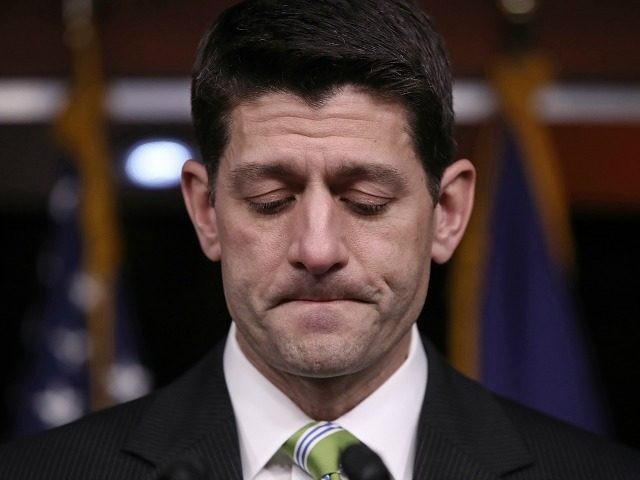House Speaker Paul Ryan’s failure to deliver on President Donald Trump’s agenda has sent his approval rating into a tailspin as nearly a majority of Americans disapprove of his job performance, a new Bloomberg National Poll shows.
A whopping 48 percent—nearly a majority—view Ryan in a negative light, while just 36 percent view him in a positive light in the Bloomberg poll released Tuesday. The poll was conducted from July 8 to July 12 and represents a near mirror flip from Ryan’s standing back in December when 47 percent looked at him positively and 31 percent viewed him negatively.
“It would be hard to find a Republican who has suffered more than House Speaker Paul Ryan as Congress and President Donald Trump have struggled to turn GOP promises into reality,” Bloomberg’s Anna Edgarton and John McCormick wrote on Tuesday, adding:
More people now view the House speaker in a negative light rather than a positive one, 48 percent to 34 percent, according to a Bloomberg National Poll, conducted July 8-12. In December, 31 percent held a negative view, while 47 percent looked at him favorably. It’s a dramatic turn for one of the Republican Party’s biggest stars and its 2012 vice presidential nominee. The approval rating decline for Ryan is the largest among GOP leaders measured by the Bloomberg survey — and exceeds the drop in approval for the party, Congress and Trump.
Pollster J. Ann Selzer, who conducted the survey, said this is a remarkable drop-off for Ryan.
“It’s unusual to see this big a flip, especially for a guy who is somewhat behind the scenes,” Selzer said. “But he’s in charge of Congress and Congress is not delivering.”
During the timeframe of December to July, President Trump has dropped from 50 percent to 41 percent in net favorability, and the Republican Party dropped from 44 percent to 37 percent. The Democratic Party has remained steady at 42 percent net favorability. A chart contained in the piece details just how badly Americans view Ryan and how fast they have turned on him:
Paul Ryan's Approval Suffers as Republican Agenda Stalls: https://t.co/SkPwAvR0Gv w/ @annaedge4
— John McCormick (@McCormickJohn) July 18, 2017
Ryan’s drop-off in popularity coincides with the failure of the U.S. Senate to pass a bill that simultaneously repeals and replaces Obamacare. The Senate’s latest iteration fell apart Monday night, and in response, President Trump and Senate Majority Leader Mitch McConnell called for a clean repeal of Obamacare now followed by a bipartisan replacement plan later. Ryan, offered the opportunity multiple times to back this new play at a press conference on Tuesday morning, doubled down on the failed GOP congressional plan.
This all comes after Ryan failed multiple times himself this year to get the American Health Care Act (AHCA) that repeals and replaces Obamacare simultaneously through the House. Ryan infamously had to call off a Floor vote amid his failure to win enough support for the bill among his own colleagues. But then, while Ryan was traveling in Hollywood and Europe, House Freedom Caucus chairman Rep. Mark Meadows (R-NC) joined with Rep. Tom MacArthur (R-NJ), who was the co-chairman of the House Tuesday Group at the time, to patch an amendment together that won enough support to pass a new version of the bill through the House.
Meadows has now backed President Trump and Majority Leader McConnell’s new plan to pass a clean repeal now and a replacement later. Ryan refuses to support the president and Senate GOP leadership.
Paul Nehlen, the Republican candidate in Wisconsin’s first congressional district, who is running against Ryan for his congressional seat, is calling on Ryan to step aside so President Trump can move forward with his agenda:
https://twitter.com/pnehlen/status/887364852800339968
It is worth noting that Meadows and MacArthur succeeded in getting the first bill through the House with no help from Ryan in negotiating their amendment. And since Thursday will mark exactly seven months since President Trump’s Inauguration Day, Ryan’s failures have led to seven wasted months in Washington at the critical beginning of the Trump administration. A piece in the Week released Tuesday notes that this may be the least productive Congress in more than 160 years.

COMMENTS
Please let us know if you're having issues with commenting.